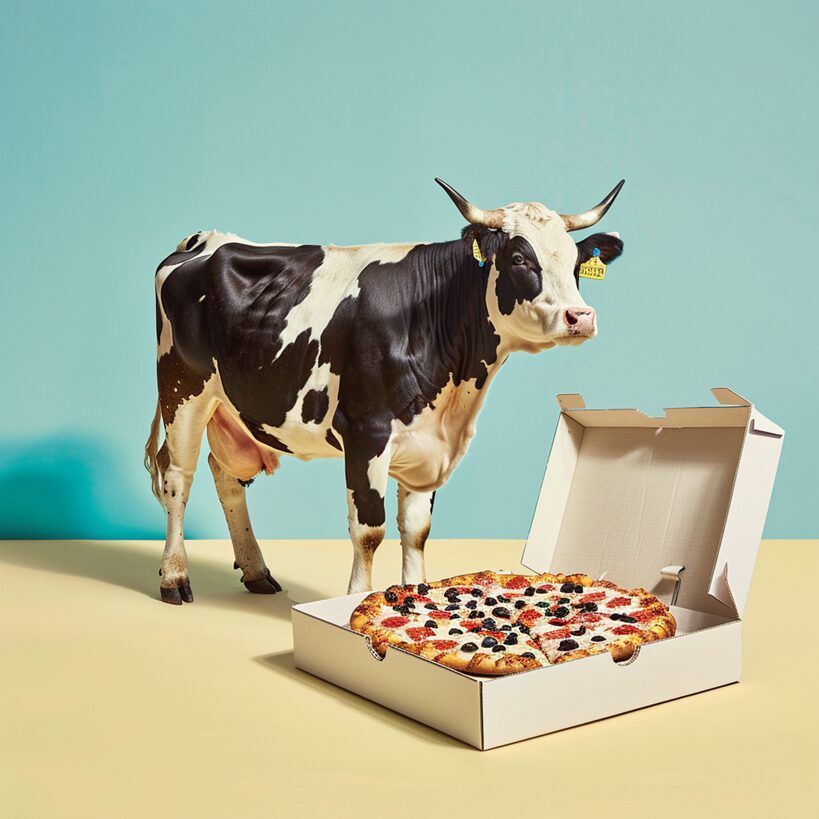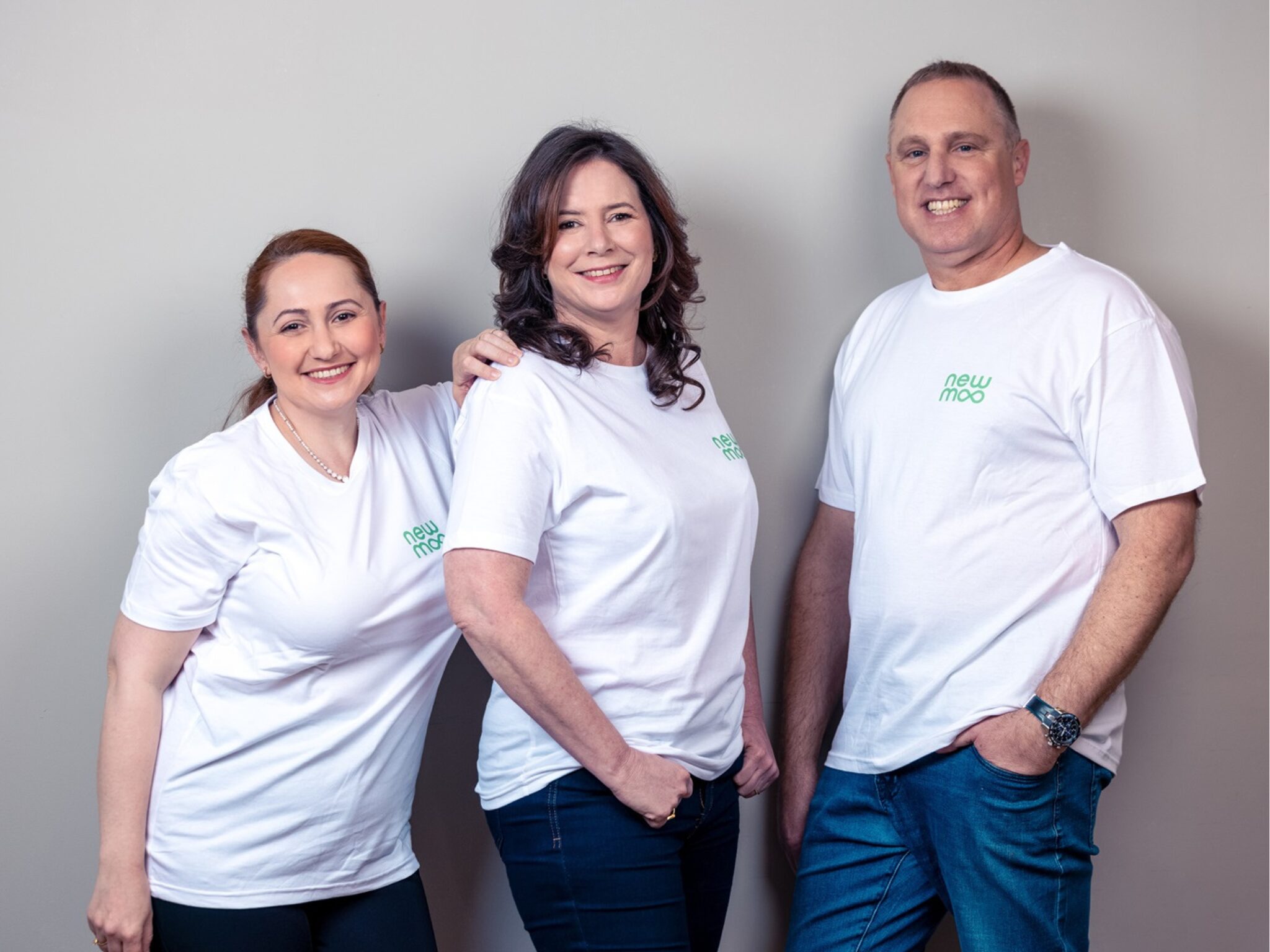Molecular Farming Startup NewMoo Debuts Liquid Casein from Soybeans for Animal-Free Cheese
5 Mins Read
Israeli startup NewMoo is using soybean plants to produce casein proteins in liquid form for animal-free cheese applications, with plans to partner with the dairy sector.
As the molecular farming space continues to blossom, NewMoo has launched from stealth mode to debut casein proteins grown in soybean plants, which are turned into liquid form for animal-free cheese production.
Casein proteins (which make up 80% of the protein content in milk) are considered the “holy grail” of milk structure, according to NewMoo. Its emulsification properties keep water and fats from separating in cheeses, and give them the sought-after melty and stretchy texture.
While startups like New Culture, Change Foods, Fermify, Zero Cow Factory, and Standing Ovation are all producing casein via precision fermentation, and Alpine Bio and Finally Foods are doing so via molecular farming, what sets NewMoo apart is its final product, which is a liquid casein base, instead of a protein powder.
“This allows us to be more cost-effective, as we avoid the complex and expensive processes of separation and purification of caseins,” co-founder and CEO Daphna Miller tells Green Queen. “It helps us minimise time and capital expenditure for new food development for dairy brands – by ensuring our product seamlessly integrates into their existing factories and processes.”
Miller and her team have extensive experience in the dairy industry. “It was important for us to develop a strategy and product that is not only sustainable and great for the planet but also aligns with industry standards in terms of costs, scalability, and compatibility with existing infrastructure, so it can be a great choice for the dairy brands,” she says.
How NewMoo turns soybeans into liquid casein

Founded in 2021, NewMoo’s technology is built on research and IP from the Weizmann Institute of Science in Rehovot, which developed both casein and whey proteins in one plant. After analysing the animal-free dairy market, the startup decided to focus on the former for cheese applications, starting with mozzarella.
“Our technology is versatile and can produce any protein in almost any selected plant, it all depends on our strategy and the needs of the industry,” says Miller.
“We researched many plant options, but came to the understanding that for our targeted end result, soy plants are the best host to start with,” she adds. “There are many reasons for this: the vast knowledge around soy, research and regulation as a GM crop, its price, the yield, the quantity of protein, and even the know-how of the soy milk industry.”
Milk contains four types of casein proteins, which fold into a spherical structure known as a micelle – they are suspended in a highly hydrated solution and bound together with minerals like calcium. NewMoo’s tech can produce two or more bovine proteins in a single plant.
“This approach incorporates novel cloning tools that allow us to introduce multiple proteins – specifically caseins – and their regulatory mechanisms into a single plant, targeting expression in the plant’s seeds,” explains Miller. But since it is targeting the dairy market with functional animal-free casein proteins, it is now developing all four caseins found in conventional cheese.
NewMoo genetically engineers soybean seeds to express casein proteins, which are then sown in outdoor fields. After harvesting, they undergo a process that yields a hormone-free liquid casein base. “We developed a unique process that is based on well-known food technologies, processes, and machinery in the soy industry, to produce our liquid caseins,” says Miller.
“Through this method and process, we take our NewMoo soy seeds, water, carbohydrates and special plant fats, and produce our NewMoo liquid base caseins that can seamlessly be used in the current cheese factories and manufacturing processes.”
Creating a win-win-win solution

A market tipped to reach $3.5B by 2029, molecular farming is advantageous as it relies on plants instead of expensive bioreactors – as is the case with cultivated or precision-fermented proteins – which makes it a more easily scalable and cost-effective process.
“Precision fermentation is a well-known technology and its successful practice is mainly in pharmaceutical and cosmetics. While it’s super useful for certain types of products, it is also an expensive technology, not only because of the capex for building factories, but also because of the potential yield of proteins in the production,” says Miller.
“In plant molecular farming, you don’t need factories – agriculture and fields are the production lines, and the potential yield is high enough to make this technology competitive and cost-effective even to the dairy industry, which requires a large amount of functional proteins,” she adds. The cost advantage also comes into play with the liquid format of the casein, which eschews the need for “the complex and expensive process of separation and purification”.
NewMoo has previously raised $7M in seed funding to build its team, R&D tech, and downstream process for the liquid casein. It will initiate a new investment round next year to support the R&D process for genetics and food development, and grow its first seeds with all the required caseins inside them for cheese applications. As it progresses its path to market, it now also aims to finalise its genetic research to prove the potential of molecular farming and its unique approach for animal-free products.
One major hurdle will be the regulatory landscape. “Most of the soy grown globally is genetically modified, so there is a lot of learning, know-how and regulation to learn from and follow,” says Miller. “The main challenge is how to control our production lines (our fields) and our supply chain, and make sure we are keeping the identity preservation of our crops, due to the fact that the seeds contain milk allergens.”
It’s an important point – while this liquid casein is lactose-free, it’s bioidentical to bovine casein, making it unsuitable for people with dairy allergies. But it will appeal to the 73% of consumers who are unhappy with the texture of vegan cheese and want creamy products that taste and melt better.
Miller reveals that as Newmoo is developing technologies for use throughout the production line, it has been in discussions with dairy manufacturers to learn and collaborate. “This has positioned us very close to large dairy organisations,” she says. “We intend to finalise our development and trials, and to provide the animal-free cheese industry with our NewMoo casein liquid base in a few years. As a startup, we have the ability to move fast, and that’s what we’re doing.”
She adds: “At the end of the day, we want to create a win-win-win situation. Farmers don’t need to change a thing in the way they grow soy plants, dairy brands don’t need to change their production lines, and consumers can enjoy tasty non-animal dairy cheese at competitive pricing.”



